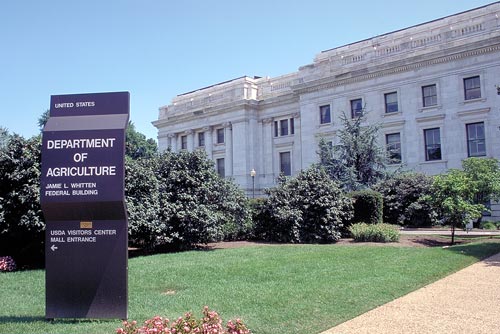September 22, 2010

USDA has announced five new inductees into its Hall of Heroes.
Established in September 2000, the USDA Hall of Heroes recognizes those that have had a lasting impact on agriculture and related programs.
Honoring the inductees with plaques in the entry hall of USDA’s Jamie L. Whitten Federal Building, these leaders — both past and present — receive a permanent tribute to their agricultural contributions.
New honorees include Norman Berg, Thomas Monroe Campbell, Senator Tom Harkin, Senator George McGovern, and Justin Smith Morrill. Vilsack will recognize the honorees in a ceremony on the Whitten Patio this evening.
“Each of these individuals has dedicated their public and private lives to improving various facets of food and agriculture,” said Agriculture Secretary Tom Vilsack. “As a result, rural communities are stronger, people in America and throughout the world have abundant food, kids have access to more nutritious meals, and our public and private lands are better conserved. It is an honor to recognize and pay tribute to those who and contributed greatly not only to USDA, but also those who live in this great country.”
Background on honorees:
• Norman Berg (1918-2008) grew up on a family farm, and witnessed from a young age the importance of farmland protection and preservation in America. Berg first joined the Soil Conservation Service, now known as Natural Resources Conservation Service, in 1943 — later to be appointed Chief of the Soil Conservation Service by President Carter in 1979. Berg was instrumental in passing the Soil and Water Resources Conservation Act of 1977, which helped USDA gain the authority to assess natural resources and develop a national conservation plan. He also originated NRCS’ National Resources Inventory, which helped form the farmland protection movement. After retiring, Berg served as an advisor to the American Farmland Trust, worked with the Soil and Water Conservation Society, and lent his years of experience and acquired knowledge to the USDA Graduate School.
• Thomas Monroe Campbell (1883-1956) was the nation’s first black agricultural extension agent. After receiving his training from Tuskegee Institute, Campbell worked to encourage modern agriculture and land-management methods among the rural farmers of Alabama. Campbell used the outreach tool known as the “Jessup Agricultural Wagon,” which served as Tuskegee Institute’s Movable School of Agriculture. Campbell used the transportable classroom to demonstrate improved methods of farming, which aided in economic improvement for black farm families. Campbell received awards and drew wide recognition for his service in the field of farming and rural life.
• Sen. Tom Harkin has been a dedicated champion for agriculture since his election to Congress in 1974, working on a range of issues from farm income protection systems to child nutrition. His career as Senator began in 1984, and he has served as Chairman of the Senate Committee on Agriculture, Nutrition, and Forestry between the years of 2001-2003 and 2007-2009. Among Harkin’s many memorable achievements are his authoring of the Conservation Stewardship Program, as well as his work on both the 2002 and 2008 Farm Bills in the Senate.
• Sen. George McGovern dedicated his public service, as well as private life, to the elimination of hunger both at home and abroad. McGovern’s impressive duties range from serving as both Representative as well as Senator from South Dakota, U.S. Ambassador to the United Nations Food and Agriculture Organization in Rome, and World Food Program’s UN Global Ambassador on World Hunger. As a champion in federal nutrition efforts, McGovern worked with former Senator Robert Dole in creating an international school lunch program, as well as aided in the creation of the National School Lunch and WIC programs; both are strong programs in USDA today.
• Justin Smith Morrill (1810-1898) acted as the driving force behind the College Land-Grant Act, legislation which laid the framework for the highly productive, science-based agricultural systems still in place today. This legislation, known as the Morrill Acts, is complete with two governing principles: the equality of opportunity and the utility of knowledge. The Land-Grant Acts helped set up the Nation’s system of land-grant colleges, providing public land to each state that financed Agricultural education. The second Morrill Act required that no funding be distributed to any state that differentiated education on the basis of race, or that did not issue funds equitably to parallel institutions.
You May Also Like




